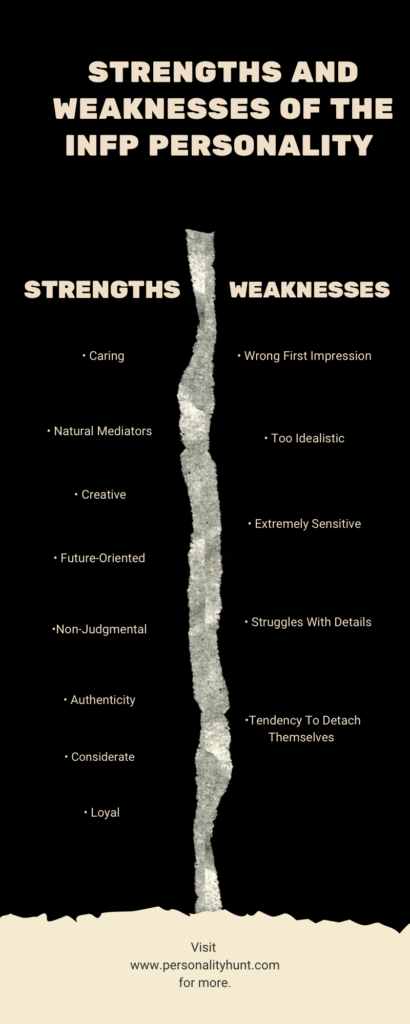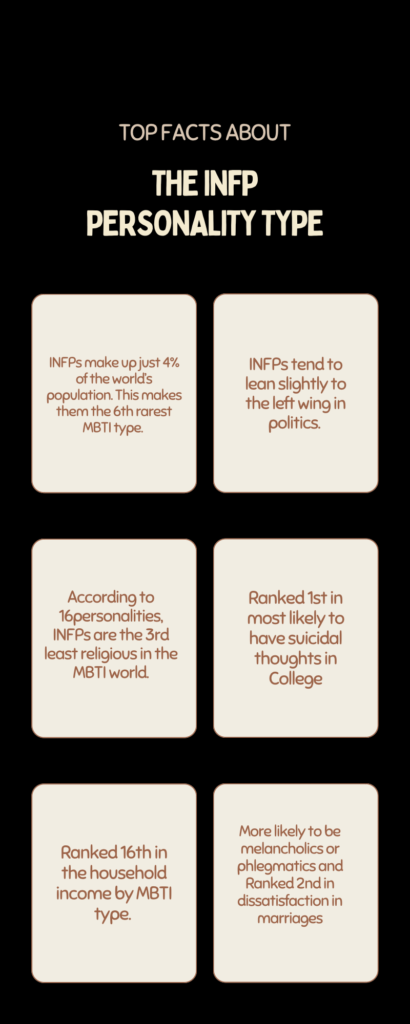Mediators, peacemakers, and many other names. You’ll see this and many more about INFPs. The INFP personality type is much more than these nicknames.
Here’s an in-depth description of the INFP.
An In-depth Description of the INFP
INFP means
- Introvert (I)
- Intuitive (N)
- Feeling (F)
- Perceiving (P)
However, these four functions do not come close to defining who INFPs really are.
INFPs are passionate people. Passion to them is pretty simple. Whatever they find appealing and makes them curious is worth dwelling on. This is made possible by their powerful minds and imaginations.
INFPs are idealists. This means that they see the world as how it should be. Because of this, they tend to enjoy the little things more and are more likely to daydream about perfect scenarios.
Their idealistic traits are further harnessed by their core beliefs and values. INFPs, though introverted, go hard for the things they believe in. They believe in standing for the truth. People are often surprised by how stubborn they become when defending the truth.
Their willingness to defend what they believe in buttresses their authenticity. INFPs are genuine. However, knowing the inner desires and motivations of an INFP is difficult.
INFPs are big on human relationships. They seek deep connections with their loved ones. They are compassionate and natural nurturers. People who spend considerable time with INFPs usually experience warmth and a lot of empathy. Their empathetic nature means they are always ready to help others.
The INFP personality is on a search for purpose.
INFP’s Cognitive Functions and Why They Matter
Every MBTI type has a cognitive stack. This stack explains how each type absorbs information, perceives the environment, and makes decisions.
For the INFP, their cognitive stack is
- Introverted Feeling (Fi)- Dominant
- Extroverted Intuition (Ne)- Auxiliary
- Introverted Sensing (Si)- Tertiary
- Extroverted Thinking (Te)- Inferior
INFP and Fi
The introverted feeling function is an internal compass for the INFP. It stores their values and ideals. These values are formed through constant interaction with their environment or other people.
Because Fi is their dominant function, INFPs rely on it often. So, before they make any decision, they run it through the Fi function to see if it aligns with their values and ethics. If it doesn’t, their auxiliary function kicks in.
INFP and Ne
INFPs use extroverted intuition as their auxiliary function. This allows INFPs to express themselves eloquently when needed. This makes them good communicators and sends their brains into overdrive.
Ideas and possibilities abound. Together with their warmth and emotions, this enhances their creativity. When combined with Fi, their Ne allows them to express their values clearly.
INFP and Si
INFPs use Si less than the previous two functions. In a way, Si is underdeveloped in a lot of INFPs. This function allows them to remember past experiences and details.
With this knowledge, they are armed with what has worked for them and what hasn’t. However, because Si is underdeveloped, INFPs ignore this function a lot.
This is why INFPs remain as adventurous even when the situation might be risky. It is also why they can also be considered non-conformists.
INFP and Te
INFP use Te as their inferior function. This means it’s even less developed than the previous three functions. This function allows INFPs to think objectively and verify data absorbed from the environment.
INFPs hate doing this and usually only rarely resort to this function. This is because this function contradicts Fi, which is their main function.
INFPs selectively use this function.
Strengths of the INFP Personality Type

- Caring
INFPs are compassionate. They genuinely care about others and want them to succeed. This makes them natural nurturers.
INFPs make people feel at home and are usually generous with their time. Their caring nature is unmistakable.
- Natural Mediators
Most INFPs have an innate desire to avoid conflict. Because of this, they become good negotiators. This makes them natural mediators.
This is helped by their pure intention to be helpful. Of course, this trait also means they excel at jobs that require soft skills such as conflict resolution.
- Creative
Most INFPs experience creative overload. As earlier stated, this is because of their Ne and Fi. This also translates to the type of careers they take on. They want a bit of creativity and room to express themselves.
INFPs make good writers, artists, and poets.
- Future-Oriented
INFPs are intuitive. This means they prioritize abstract conversations. It also means that they live in the future. This is one of the reasons why they daydream a lot.
INFPs enjoy looking at the bigger picture and planning for years ahead. They could plan their wedding, careers, and even funeral before they’re 20!
- Non-Judgemental
INFPs are mostly liberal and unconventional. Thus, they rarely judge others and are willing to accept the differences in culture or norms.
However, this does not mean they trade their values. They are just more understanding.
- Authenticity
INFPs are genuine. The problem might be getting to know them better. However, for those close to the INFP, what you see is what you get.
INFPs are honest, kind-hearted people who want to live and let live. Their authenticity shines through regardless of the occasion.
- Considerate
As stated earlier, INFPs care about others. They empathize with people’s problems and try to fix them when possible. They might also be willing to give advice and counsel.
Don’t want any of that? You can trust the INFP to just listen when you speak. They are the perfect friends.
- Loyal
Talking about friendships, INFPs are incredibly loyal. They know who their loved ones are and stand by them through thick and thin.
This is probably why betrayal cuts deeper for them. They cannot understand why their friends wouldn’t want to treat them the same way.
Their idealistic tendencies further compound this feeling.
Weaknesses of the INFP Personality type
- Wrong First Impression
INFPs seek meaningful connections. However, you might not get that vibe at first glance. INFPs are notorious for seeming aloof or disinterested in others. However, nothing could be further from the truth.
They are mostly shy or uncertain about how to approach others. Some might even be clumsy at it. This wrong impression might limit their connections with others.
- Too Idealistic
Their ideals and values define the INFP. However, it can also be their downfall. INFPs might expect perfection or fairytales in their careers or relationships.
They can become disillusioned or dissatisfied when their idealistic expectations fail to materialize.
This can lead to failed relationships, constant career switches, and unhappiness.
- Extremely Sensitive
This is likely because of their emotions. INFPs are sensitive to criticisms and feedback. They are sensitive to how others treat them.
Their sensitivity puts them at a disadvantage in certain careers. It can also derail their self-development.
- Struggles with Details
As earlier stated, INFPs are future-oriented. They enjoy looking at the bigger picture. While this has its benefits, it can also be limiting.
INFPs will struggle with details. Numbers and small details needed to make a project work might be difficult to read or execute.
- Tendency to Detach Themselves
As introverts, INFPs tend to detach or withdraw from others. The more this happens, the more isolated they become.
The problem here is that INFPs crave meaningful connections. So, a lack of it will lead to problems. In a worst-case scenario, this can lead to depression.
INFP in Relationships and Friendships
- Lots of Affirmation
INFPs often struggle with criticism, their emotions, and failed expectations. So, they look for reassurance in their friendships and relationship.
Give them lots of affirmation and make them feel special. An easy and inexpensive way to do this is by listening to them when they speak about their problems.
That means a lot.
- Physical Touch
INFPs are suckers for intimacy. Unsurprisingly, physical touch is usually one of their main languages.
Because they are also curious, they are willing to experiment in the bedroom. If you are friends with an INFP, hugs go a long way. So, don’t hold back.
- Communication
Communication is everything in friendship and relationships. INFPs want meaningful connections where communication is done with love and consideration.
They want their partners or friends to be kind even during an argument or issue. Criticism or really harsh words won’t get you anywhere with them.
- Idealistic
Their idealism can have its drawbacks. INFPs might seek perfection in their relationships and careers. They see the world as how it should be, not how it really is.
INFPs can become disillusioned when it dawns on them that perfection or ideal situations hardly exist. They might feel they’ve made a mistake and seek ways out of this situation.
- Compatibility
Any type can be compatible. However, INFPs get along well with ENFJs and ESFJ. Click this link to learn more about the INFP and ENFJ relationships.
INFP also stands a good chance with the ESTJ. This is the best type of partner for growth and development.
INFPs and Enneagram Types
Your enneagram type greatly distorts how your INFP trait plays out. There are 9 enneagram types, and INFPs can be any of them.
INFP Type 1
The INFP type 1 focuses on perfection and being ethical. This enneagram type enhances their use of Fi and their sense of justice.
INFP 1w2 focuses on helping others and standing up for the right thing. INFP 1w9 focuses on keeping the peace while doing the right thing.
You can learn more about each type by clicking the links above.
INFP Type 2
The INFP type 2 is focused on maintaining connections and relationships. Their core desire is to be helpful to their loved ones.
INFP 2w1 is primarily focused on helping others. Depending on the strength of their wing, they’ll also want to do the right thing. Unlike INFP 1w2s, they find this more challenging.
INFP 2w3s are focused on helping others too. However, they also have personal targets or goals they want to meet. They are interested in being and looking successful. This type of INFP might also be more fashion-focused.
INFP Type 3
INFP type 3 is more focused on being and looking successful. They have ambitious goals which are the center of their lives.
INFP 3w2s want to be successful. They also want to help others along the way. Helping here could include teaching or financial assistance.
INFP 3w4s want to be successful. However, they want to do it on their terms. They strive to be unique and are a bit more creative than INFP 3w2s.
INFP type 4
INFP type 4 is more concerned about their uniqueness and independence. They want to stand out from the crowd.
INFP 4w5s want to be different. They are also the most common enneagram combination for INFPs. They are also curious and strive to be self-sufficient.
INFP 4w3s strive to be different. They also want to be successful. However, being different for them is more important.
INFP type 5
INFP type 5 are primarily concerned with being self-sufficient. They don’t want to be a burden on others.
INFP 5w4s also care about how different they look or behave. They try to be different by gathering more knowledge or through their thought process.
INFP 5w6s care more about staying secure. They want to be safe and are more cautious than INFP 5w4s.
INFP Type 6
INFP type 6 is primarily concerned with being secure. They are afraid of being financially, mentally, or emotionally insecure.
INFP 6w5s also care about research, are more curious, and tend to be more self-sufficient. INFP 6w7s, on the other hand, are more carefree, adventurous, and charming.
INFP Type 7
INFP type 7s are primarily concerned with being happy. They never want to feel deprived or stuck in a rut.
INFP 7w6s might be adventurous but have an air of cautiousness too. However, their impulses and need to be happy usually supersede their caution.
INFP 7w8s are more disciplined, ambitious, and opinionated.
INFP Type 8
INFP type 8 is more concerned about controlling their lives and resources. They are just as independent as INFP type 5s.
INFP 8w7s are more open-minded, charming, and extroverted, while INFP 8w9s are more reserved and protective. They are also more open to conflict resolution.
INFP Type 9
INFP type 9 is more concerned about maintaining inner harmony. They try to avoid all forms of conflict to achieve this aim.
INFP 9w1s also care about morals and ethics. Fi largely drives this. INFP 9w8s, on the other hand, are more interested in controlling their space or territory. While they want peace, they are not afraid of conflicts.
Top Facts About the INFP Personality Type

- INFPs make up just 4% of the world’s population. This makes them the 6th rarest MBTI type.
- INFPs tend to lean slightly toward the left wing in politics.
- According to 16personalities, INFPs are the 3rd least religious in the MBTI world.
- Ranked 1st in most likely to have suicidal thoughts in College
- Ranked 16th in the household income by MBTI type
- More likely to be melancholics or phlegmatics
- Ranked 2nd in dissatisfaction in marriages
What Other INFPs Say About Being an INFP
One of the reasons I was truly convinced when I saw that my MBTI type was INFP was the fact that they live in their heads. This is so true and something I relate with because I’m always zoning out, fantasizing about something, or daydreaming about something. I think it’s one reason I love books/ movies. I get to live in someone else’s world or someone else’s head.
One time I was googling about INFPs, I saw someone say they wished they lived in fiction. I wrote a list of things about myself recently, and one of the things I wrote down was about how I would love to become one with nature. Nature brings so much peace and calmness to my life, even when viewing it through a screen. I think that’s one reason I’m obsessed with the idea of traveling the world and visiting countries; the thought of it excites me so much I could cry.
Sometimes my emotions are so high I cry over the littlest things, get sad over things I shouldn’t, I’m deeply affected by injustices I see around the world, and they get me so angry sometimes that I don’t know what to do with that anger. Other times, I feel blank and empty, not caring about anything or anyone.
I have so much to say sometimes, but then I don’t say it because I don’t know how to express it. Truly frustrating. I’m easily stressed, and I hate strict schedules. I love flexibility and adaptability. Sometimes I feel like I’m a living paradox. I love being on my own, and I love my space. But then, I want to be around people I love and want them in my space but then not too much, but still, I want them there. I seem quiet to a lot of people, but I’m actually talkative, and so many people have expressed shock when they see me in my comfort zone
Ever since I can remember, I’ve always felt different from ‘most’ people. And for this reason, I’ve carried with me an eternal yearning for something else. Perhaps the best way to describe this might be to say that I’m yearning for “home.” Where is home? Beats me, but it’s never where I am.
As an INFP, I often find myself feeling that most people are the same- boring, predictable, and all lining up to jump into the same mass cookie-cutter rusting at the edges. They all look the same, act the same, have the same life goals, and are plainly uninteresting. That is, until I flip the script and realize that upon an outward glance, I might be flippantly tossed into an equally undeserving category. And it’s this constant inner dialogue of realizing ‘I am no better.’ That cycles through my thoughts all day. It’s arrogance, immediately humbled by my empathy switch, that really isn’t a switch at all because it’s been and always will be fixed in place.
Most people are quick to jump to the assumption that INFPs are useless hippies on a delusional quest to remove pain and suffering from the world. And to some extent, perhaps this is true- I do see pain and suffering as unnecessary and those who inflict pain on others as even more unnecessary.
But we’re not all little fluff bunnies rummaging through our shoeboxes of treasured mementos. We’re quite practical, logical, motivated, and hell, even confrontational when we want to be. Keyword: WANT. These qualities that we seemingly lack are only brought out by choice. Because they’re uncomfortable and feel stiff, stale, foreign, and dry in our vivid inner worlds. But get to know us (really know us), and you’ll find that we are extremely deep and intelligent, fiercely loyal, and probably one of the most open-minded and authentic souls you’ll ever meet.
We all make sense of the vast and mysterious world in our own way, and each method is an impressive and highly personal derivation of lists, facts, decision trees, judgments, and scribbles, all neatly stored in the privacy of our brains. INTJS make sense of the world through their constant search for intellect, efficiency, and competence. ENTPS understand the world through playful debates, by sharing opinions and ideas and using their charisma to maneuver through life. ESTPS throw themselves directly into the action, never being one to sit out on the sidelines.
As an INFP, my greatest joy and the way I ‘map’ the world around me is by collecting perspectives and thereby expanding my understanding of the world. It is this aspect that perhaps inclines me to be more ‘optimistic’ than others. For example, I struggled with severe depression and an eating disorder in high school. Because I had the chance to experience these things, I’ve also gained a direct perspective into each of these complex worlds and can accurately and confidently speak on behalf of them.
Now, could I have gained insight through a medical textbook or a memoir? Through a first-hand account or by watching a documentary? Of course. And this is where these experiences and perspectives become ranked in an ever-expanding list of how accurate my understanding is. (A movie, for example, is stored very low in priority vs. directly witnessing a traumatic event, etc.) Each event is ranked, mapped, weighed, and connected by a spiderweb of similar experiences. This is the layout of my internal map, and everything I see, do, hear, and experience is carefully integrated into its appropriate place. As my GPS and soundest form of reasoning, I have an inexhaustible need and desire to continue adding to this map. There is no topic or experience off-limits to my curiosity.
Going back to my point that INFPs are intelligent. I feel we are unconventionally so because of our understanding that intelligence is measured by the willingness to consider ALL possible perspectives rather than the single fact of what is. Don’t get me wrong- I’ve always admired decisive people; you know, those people who bulldoze ahead with confidence and utmost trust in themselves. But what I don’t envy is their judgment, their opinionated assumptions, and their inability to be open-minded or understanding. People are funny like that and refuse to look beyond their bubble, refuse to read between the lines, or peer a little deeper for just a little longer. And this is yet another observation of life that I’ve tucked away quietly into my mindmap- People can be so blind.
Another common label is that we are melancholic, emotional, and oh so prone to depression. Hey, we’re even ranked #1 in most likely to commit suicide! And I’ll tell you why- it’s because we see beauty all around us and naively assume the entire human race is also wired this way. Because we’d do anything and everything we could to help a friend who was struggling. Because we note every small detail of what makes our significant other happy and stick up for the guy being picked on because of mental health issues. Because we notice everything, love so wholly, hurt so deeply, and care so deeply in a world that simply doesn’t care. It seems that every day, I’m left feeling shattered and disappointed when I realize that people can operate on such selfish and vengeful agendas. It’s ugly, and I hate so much that the world can be so damn ugly.
Perhaps on a grand scale of Feeling, INFPS were given some sort of extension on both ends of the spectrum that no one else can seem to access. This intense and often severe infliction of feeling, combined with the fact that no one can relate, drives us to the point of utter depression. When your entire soul is built on honesty and authenticity, the reality is just too harsh and foreign of a place to be thrown into. Really, we’re aliens and, upon landing on earth, are just horrified and sad. Because people can be so blind.
INFP in the Workplace
A sense of purpose is the best way to describe the INFP’s attitude towards work. They want to feel a connection to their jobs and careers. They take what they do seriously and are always willing to improve.
So, INFPs usually stick to jobs they have a passion for. Enjoying what they do comes first before financial rewards. As stated earlier, INFPs have loads of creativity. They try to incorporate their creativity into whatever they do.
Here are some other workplace traits you might notice about INFPs.
Flexibility over Structure
INFPs prefer flexibility over structure. They prefer to work when they feel comfortable and not in a structured schedule. This means they don’t do very well with structured workplaces.
Some INFPs might also feel it stifles their creativity.
Remote Work over Traditional Work Practices
INFPs are big fans of remote work for various reasons. First, they are introverts. Coming to the office daily and dealing with chatter isn’t very appealing.
They are also big fans of flexibility, as stated earlier. INFPs work well alone. In fact, that’s when their creativity comes alive.
Feedback and Encouragement
The best way to get more from an INFP is to encourage and motivate them. Constructive criticism might only make them depressed or sad. However, by pointing out areas where they are doing well, it gives them a lift to do even better.
When you have a track record of encouraging them, constructive feedback becomes easier.
INFP and Leadership
INFPs can make good leaders. However, it’s unlikely they will reach out for such positions. INFPs value their independence and space. Being a leader means being in charge of people, which doesn’t appeal to them.
However, when push comes to shove, INFPs can shoulder responsibility effectively.
INFP and Money
INFPs are generally not big spenders. However, they also are not the highest earners. According to Truity, INFPs are among the lowest earners in the MBTI.
This does not mean all INFPs earn lower incomes. It just means there are fewer INFPs in the higher income spectrum compared to other MBTI types.
INFPs are also perceivers. Thus, they are prone to impulse buying and financial mismanagement. Depending on their enneagram type, this can be significantly worse or better.
Best Careers for the INFP Personality Type
- Psychologist
- HR Manager
- Writer
- Travel Blogger
- Graphic Designer
- Actor/Actress
- Pre-school teacher
- Painter
- Artist
- Anthropologist
- Nurse
- Doctor
- Dentist
- Counselor
- Therapist
- Veterinarian
- Photographer
- Mental Health Counselor
- Fashion Designer
Worst Careers for the INFP Personality Type
- Accountant
- Auditor
- Sales Representative
- Judge
- Mechanic
- Electrician
Fictional/Famous/Anime Characters that are INFPs
- Luna Lovegood (Harry Potter)
- Princess Diana
- Chifuyu Matsuno (Toyko Revengers)
- Wanda Maximoff (Marvel)
- Ben Solo (Star Wars)
- Melanie Martinez
- Audrey Hepburn
- Peter Parker (Marvel)
- Barry Allen (The Flash)
- Marshall Eriksen (How I met your Mother)
- Belle (Beauty and the Beast)
- Keanu Reeves
- Luke skywalker (Star Wars)
- Richard Watterson (The Amazing World of Gumball)
- Alphonse Elric (Fullmetal Alchemist: Brotherhood)
- Aurora
- Elena Gilbert (The Vampire Diaries)
- Robert Pattinson
- Violet Parr (The Incredibles)
- Maxine (Life is Strange)
- Frodo Baggins (Lord of the Rings)
- Bubbles (The Powerful Girls)
- Andrew Garfield
- Williams Shakespeare
- Tom Hiddleston

































Could you do ESTJ 8w9 within the next week or so?
Hey K,
I’ll definitely try!